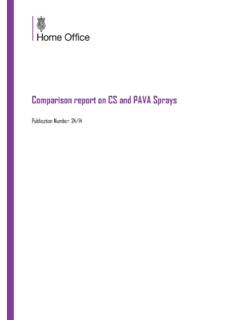Transcription of Training Practices For CCTV Operators - ipcctv-solutions.com
1 POLICESCIENTIFICDEVELOPMENTBRANCHHOME OFFICEPOLICE POLICYDIRECTORATECCTV: Making It WorkTraining Practices For cctv OperatorsC Diffley and E WallacePublication No 9/98 SDBPCCTV: Making It WorkTraining Practices For cctv OperatorsC DIFFLEYE WALLACEP ublication 9/98 POLICE SCIENTIFIC DEVELOPMENT BRANCHHOME OFFICE POLICE POLICY DIRECTORATEPSDB 9/98iiCCTV: MAKING IT WORKTRAINING Practices FOR cctv OPERATORSC DIFFLEYE WALLACEFIRST PUBLISHED (1998) CROWN COPYRIGHT (1998)The text of this publication may not be reproduced, nor may talks or lectures based o nmaterial contained within the document be given, without the written consent of theDirector, Home Office Police Scientific Development : 1 84082 045 4 PSDB No: 9/98 Published by:Home OfficePolice Scientific Development BranchSandridge, St AlbansHertfordshire AL4 9 HQUnited KingdomPrinted by:White Crescent PressCrescent RoadLutonBedfordshirePSDB 9/98iiiManagement SummaryThis document provides guidance for the Police Service and local authorities ( ) on trainingCCTV Operators .
2 The guidance concentrates on the Training requirements of Operators who monitorpublic areas such as town centres and have a high level of interaction with police staff andprocedures. The material in this document may also be of value to those who are Training in otherareas where the post holder monitors cctv pictures , in the Prison Service. Pilot trials withseveral police forces have confirmed its value, even to those with previous experience of trainingCCTV document: discusses the importance of Training , highlighting the specific requirements of public area cctv Operators ; gives step-by-step instructions on taking a competence-based approach to Training . This may betailored to the specific requirements of individual systems; lists examples of competencies an operator may need to carry out his or her job effectively(Appendix A); provides advice on identifying operator Training needs using a comprehensive checklist(Appendix B) of relevant skills and knowledge.
3 This checklist also provides a framework forrecording and monitoring Training needs and provisions gives advice on methods of designing, delivering and evaluating Training programmes andproviding Operators with continuous development; provides examples of good practice and a self-check questionnaire. These will allow assessmentof how well Operators are being trained and how Training can be publication is one of a series of PSDB documents providing advice on good practice forimproving cctv system performance. These publications are listed in the customers for the work on which this document is based are the Police Force cctv LiaisonOfficers Forum (which reports to the ACPO Crime Prevention Sub-Committee) and the CrimePrevention Agency of the Home 9/98ivContentspageMANAGEMENT is public area cctv operator Training important?.. a competence-based approach to SYSTEMATIC APPROACH TO 1: assess Training 2: state the Training 3: establish the Training 4: decide who can contribute police input.
4 5: choose delivery methods .. 6: monitor and evaluate Training .. 7: provide for continuous development and 173 Training GOOD PRACTICE NAMES AND AUNITS OF monitoring element of competence monitoring element of competence BCCTV operator Training Illustrations and FiguresFigure 1 Illustration of the Training cycle 2 Calculation for generic Training 3 Calculation for tailored Training 1 Instructional technique 4An example Training time 5An example extract from a Training time 2 Measures for evaluating and monitoring the effectiveness of Training ..16 PSDB 9/9811 INTRODUCTION1 . 1 Project customersThe customers for PSDB s cctv Effectiveness programme, which started in 1993, arethe Police Force cctv Liaison Officers Forum (which reports to the ACPO CrimePrevention Sub-Committee) and the Crime Prevention Agency of the Home Office. Thisprogramme concluded at the end of 1996/97 and was followed by a one year programmecalled cctv - Making It Work.
5 This publication is a product of these two programmesand is part of a series which includes: Recruitment and Selection of cctv Operators ; Operational Requirements Manual; cctv Control Room Ergonomics; Police Interaction with cctv ; cctv Technical Testing; and cctv User Picture Detail BackgroundThis document provides guidance for the Police Service and local authorities on thetraining of cctv system Operators are the link between the system technology and its effective operator s performance will largely determine the level of service provided by thesystem. The Operators of public area cctv systems are fast becoming integral playersin town centre management, for crime prevention, incident scene management and ininvestigation selection and recruitment Practices teamed with targeted Training , are neededto ensure that Operators are proficient at their job: maximising system effectiveness andlimiting its misuse. Targeted Training will not only improve the quality of serviceprovided, but will also increase staff satisfaction and may help to reduce absenteeismand staff area cctv Operators have specific Training needs over and above those ofoperators of private or commercial systems.
6 Both the police and local authorities havevaluable contributions to make in ensuring public area cctv Operators are trainedappropriately. This guidance is based on the findings of a PSDB survey of police andlocal authority Training Practices , a number of workshops held at PSDB and generalgood practice principles applied to cctv . It takes account of current industry standardsand 9/9821 . 3 Why is public area cctv operator Training important?It is important that an operator of any type of cctv system can demonstrate thecompetence needed to carry out his or her work. The need for a consistently highperformance from a public area cctv operator , however, may be even makes the public area cctv operator different?PSDB research has shown that the public area operator 's job demands are more complexand of a higher level of difficulty than most other cctv operator s jobs. Consequently,these Operators have a number of specific Training needs which differ from those of otherkinds of cctv Operators .
7 A public area cctv operator s job, for example, requires: more interaction with police officers and procedures. The police need tobe able to include the public area cctv system in their operational planning (andpolice officer Training arrangements) to make maximum use of the services thesystem can provide. To do this, to their satisfaction, the police must be able to relyon a consistent level of performance from the cctv system staff; more use of proactive, in addition to reactive monitoring of cctv camera images. Practical evidence gathering activities require the operator to targetviewing, predict and seek out offences and offenders. He or she will often have tomake use of privileged information and make safety critical decisions withoutsupervision. An operator in this position needs to be dependable and responsible forher or his actions; and greater responsibility for care of the public.
8 The operator may help toensure the public s safety and security without victimisation or challenging civilliberties. To maintain public support for cctv , an operator needs to be accountablefor her or his actions. It is imperative that the operator receives clear direction onwhat the system is and is not to be used for and how to and how not to use . 4 Taking a competence-based approach to is competence?A person is said to be competent at their job if he or she has the ability to perform itscomponent work activities consistently to the expected level of performance (NCVQ1996).Work activities can be broken down into tasks, duties and responsibilities which need tobe carried out. These may then be described in terms of behaviours and actions whichcan be demonstrated, standards of performance that should be reached and any specialconditions. Work activities described in this way are termed 9 take a competence-based approach to Training ?
9 Many benefits may accrue from taking a competency-based approach to Training , Forexample, competence can be: measured. Assessing what competence an individual has and lacks is a relativelystraight-forward process; related directly to the tasks carried out in the job. Consequently, trainingsolutions can be designed to meet the needs of the operator and the systemtogether; and used as a criterion for performance appraisals, helping to target an operator scontinuous can Training help Operators to be competent at their job?When an individual demonstrates competence in a work activity ( achieves the desiredoutcomes to the required standard of performance), he or she is also demonstratingpossession of underpinning knowledge, skill, understanding and personal effectivenessneeded for that alone can not provide an operator with competence. It can, however, providethe underpinning knowledge and understanding of concepts, procedures and techniquesand an opportunity to develop skills needed to be competent.
10 This may then be appliedand practised in the workplace to help the operator gain the SITO / City & Guilds National Vocational Qualification (NVQ) 7268 National Vocational Qualifications (NVQs) provide a framework for a competence-basedapproach to Training in different occupational areas. The NVQ process of workplaceaccreditation certifies achievement of national standards of performance. It also providesan hierarchical structure of qualifications which can be used as goals for Training anddevelopment. A successful candidate is provided with nationally recognised evidence ofthe ability to carry out work activities competently. This helps in transferring competencebetween Security, Safety and Loss Prevention level 2 NVQ (SITO / City & Guilds 7268) hasbeen developed to provide a set of competence standards for guards working in differentsectors of the security industry. It includes units of competence relevant to cctv Operators .




